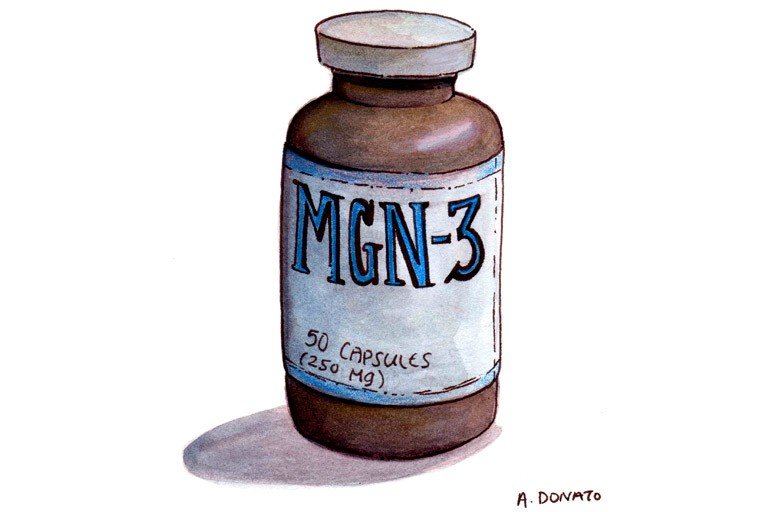
Common Names
- Modified rice bran
- Arabinoxylan rice bran
For Patients & Caregivers
Tell your healthcare providers about any dietary supplements you’re taking, such as herbs, vitamins, minerals, and natural or home remedies. This will help them manage your care and keep you safe.
MGN-3 has not been shown to prevent cancer, HIV or any other medical condition.
MGN-3 is a complex sugar derived from rice bran treated with extracts from three mushrooms: Shiitake, Coriolus versicolor, and Suehirotake. The manufacturer claims that it stimulates several aspects of the immune system, causing overall immune stimulation. Lab studies suggest that MGN-3 can cause cell death in some cancer cells and increase their susceptibility to chemotherapy drugs.
Only a few short-term studies have been conducted in humans. Preliminary data suggest it may improve response and reduce side effects of standard therapies in liver cancer patients, but larger studies are needed to confirm these observations.
- To treat cancer
A small study suggests MGN-3 may improve response to standard therapies in liver cancer patients. However, there is no evidence that it can be used as a treatment alone, and larger studies are needed. - To prevent and treat chemotherapy side effects
MGN-3 reduced the side effects of standard therapies in liver cancer patients, but additional studies confirming such effects are needed. - To stimulate the immune system
MGN-3 stimulated immune cells in lab studies and small studies of cancer patients, but additional studies are needed. - To treat chronic fatigue syndrome
A clinical study did not find MGN-3 effective in treating chronic fatigue syndrome.
- No side effects have been reported.
For Healthcare Professionals
MGN-3 is a proprietary product derived from rice bran treated with extracts from three mushrooms: shiitake (Lentinus edodes), kawaratake (Coriolus versicolor), and suehirotake (Schizophyllum commune). Promoters of MGN-3 claim that it improves immune functioning against cancer and AIDS.
In vitro and animal studies suggest MGN-3 might be useful in mounting immune responses against infections and cancer (15), facilitate apoptosis of human T-cell leukemia cells (6), and protect against weight loss induced by cisplatin (8) and radiation (11). Other preclinical models suggest it may act as a chemosensitizer (7) (10) (16) (17) and radiosensitizer (18), and exert cytotoxic (19) and chemopreventive (20) effects.
A few small short-term studies of MGN-3 have been conducted in humans. Some suggest improvements in irritable bowel symptoms (21), health-related quality of life in older adults (22) and reduced viral load in patients with chronic hepatitis C (23). In small studies of cancer patients, MGN-3 increased overall response and reduced adverse effects of standard therapies (1), and improved immunomodulatory function (5) (12). Other preliminary studies suggest possible benefit with rice bran arabinoxylan in combination with curcumin for patients with early-stage blood cancers (24).
Rice, mushrooms
- Cancer
- Chemotherapy side effects
- HIV, AIDS
- Immunostimulation
MGN-3 is an arabinoxylan from rice bran made using enzymes from mycelia of shiitake, kawaratake, and suehirotake mushrooms. The bioactive constituents are thought to be polysaccharides, which modulate TNF-alpha and IFN-gamma secretion, and augment NK cell function in vitro (3).
In rat models, MGN-3 exerted protective effects against liver injury by reducing expression of IL-18 (13). It also protected against hepatitis by suppressing inhibition of NF-κB, JNK phosphorylation, and CD14 expression (14).
MGN-3 displayed synergistic effects with paclitaxel by causing DNA damage, enhancing apoptosis, and inhibiting cell proliferation in murine breast cancer cells (10). In another study, MGN-3 exerted antioxidative activity and protected against radiation-induced loss of body and organ weight in mice (11).
In a study of myeloma patients, MGN-3 increased NK cell activity, the number of myeloid dendritic cells in peripheral blood, and concentrations of T helper cell type 1-related cytokines (12).
None reported.
None reported.
MGN-3 reduces alpha-fetoprotein levels in hepatocellular carcinoma patients undergoing standard therapies (1).